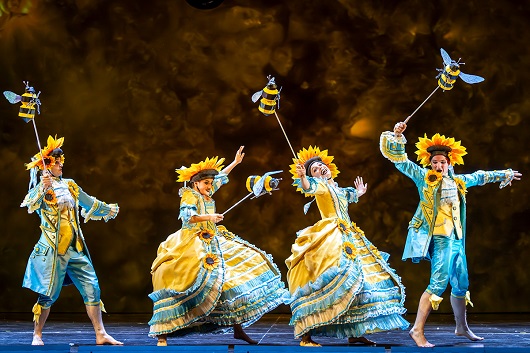Using stories to communicate about sustainability

The Critical Sustainability Stories (CriSS) Tool is being introduced to professional storytellers to help them effectively communicate about the climate.
Dr Rory Padfield, Associate Professor in Sustainability and Business, co-produced the CriSS Tool alongside Dr Gemma Bridge (also in the School of Earth and Environment), Dr Alexandra Dales (York St John University) and UK creative sector partners.
The tool supported Opera North’s Green Season in 2023. There is considerable interest for further uptake from professional storytellers and UK-based arts and cultural organisations including the British Academy of Film and Television Arts (BAFTA).
What is the Critical Sustainability Stories (CriSS) Tool?
The CriSS Tool was designed for professional storytellers seeking to curate stories that portray the complexities of the climate crisis and sustainability challenges that society faces.
It is an educational organising framework designed to:
- Increase engagement with evidence-based research in creative stories;
- Grow the reflective and iterative learning capacity of storytellers when exploring sustainability topics; and
- Provide opportunities for the production of research-rich stories, which translate complex ideas, explore connected processes and discuss alternate futures.
How does it work?
The CriSS Tool is made up of six topic areas: Critical Activity, Audience, Storytelling Journey, Context, Quality of Information and Justice.
Each one has five or six open-ended questions connected with the theme of sustainability and climate change.
Each topic invites storytellers to engage in reflection, evaluation and participation in discussions about various aspects of the information required for their story.
The six topics provide a framework for thinking about and gathering information for story development.
Users can advance their critical thinking skills and synthesize and evaluate diverse sources of information, whether scientific research, public data or knowledge from stakeholders with experience and expertise.
The CriSS Tool can be used from the beginning and throughout the storytelling creation journey.
The six topics do not have to be addressed linearly; the user can engage with the topics as preferred and return to them iteratively as the story develops.
The Critical Activity topic is a useful entry point as it focuses on the type of analytical activity a story will engage in – be that description, explanation or critical commentary – on a specific sustainability challenge.
Why is storytelling so important for communicating about climate change?
Stories help us make sense of the world around us.
Through a variety of mediums – TV, film, art installations, theatre, music – stories play a pivotal role in public narratives on important local and global challenges, such as climate change, conflict, discrimination and impacts of pollution.
Stories are made up of narratives, which have a typical structure comprising of exposition, rising action, climax and resolution.
In climate change and sustainability stories, the narrative structure can guide audiences through the maze of data, facilitating the assimilation of important messages, as well as helping them to remember key information.
Audiences find narratives more engaging than conventional data-driven scientific communication.
In the same way, the narrative structure can provide a framework for researchers to present research hypotheses, methods and outcomes. Recent research indicates that narratives can influence audience beliefs, particularly for challenging or sensitive topics.
Creative narratives can be more persuasive and as such people tend to be more willing to accept normative evaluations from narratives than from potentially less engaging, logical-scientific arguments.
Stories can leverage the power of emotional engagement and empathetic resonance. By evoking emotions and personal connections, stories render scientific information impactful as well as memorable.
As a result, stories can influence human beliefs and actions, such as leading to an increase in altruistic behaviours.

Opera North's production of Masque of Might (2023), part of the Green Season. Photo credit: James Glossop
How did the CriSS Tool support Opera North’s Green Season?
Opera North engaged Rory, Gemma and Alexandra to support the content of their Green Season.
Since the majority of the written content for the operas themselves was close to completion, Rory, Gemma and Alexandra supported Opera North with their communication strategy for the Green Season.
Through a series of workshops and dialogue, Opera North reported the following benefits of the CriSS Tool:
- Integration into internal processes. Opera North is using the CriSS tool as an iterative process, which will develop and improve the organisation’s communication strategy over time.
- Information sharing. The CriSS Tool encourages information sharing and the inclusion of information on carbon emissions reductions by Opera North into stories to audiences.
- Internal criticality of communication. Opera North are asking themselves more questions about why they are doing certain things, eg how does the creative industry impact the industrial north?
- Employee cohesion across the organisation. The tool has given the management team confidence, information and ideas to discuss in team meetings where there are representatives from across different departments.
- Innovation sharing. Opera North’s use of the CriSS tool has created a ‘butterfly effect’ amongst other organisations including both national and international opera companies and has had growing interest from large bodies such as the Climate Commissioners for Yorkshire and Humber.
- A greater understanding of the purpose of communications. The CriSS tool has allowed open discourse for being critical when communicating sustainability messages to audiences.
Lessons from developing the CriSS Tool
- Many creative industry stakeholders want to tell stories about local and global sustainability challenges and are interested in the means by which up-to-date knowledge, discourse and debates on sustainability can be reflected in the stories.
- Despite the interest among professional storytellers, there are no clear pathways, resources or toolkits to support this specific need. There is a sense of disconnection between storytellers and those with expertise in sustainability, e.g. researchers, academics and professors.
- The relatively high levels of interest in the CriSS Tool amongst many different groups of professional storytellers reflect a broader need and desire for easy-to-use practical tools and resources.
- The CriSS tool is a timely innovation in that it provides a simple organising framework for creative stakeholders to start thinking about the integration of sustainability into their stories.
- There is wide applicability of the CriSS Tool. Rory, Gemma and Alexandra are exploring new collaborations beyond those in the creative sector. For example, in 2024 they are working with Bradford City Council on using the Tool to help create stories to communicate the Council’s Good Food Strategy. The stories developed in this project will be showcased at Bradford City of Culture 2025.
How will the CriSS Tool be used going forward?
Rory, Gemma and Alexandra are in the process of introducing the CriSS Tool to different types of professional storytellers and contexts. Examples include:
- Bradford City Council have agreed to deploy the tool as part of the communication of the Council’s Good Food Strategy. Rory, Gemma and Alexandra will deliver a series of workshops on the CriSS Tool and key topics related to food sustainability. Following completion of the workshops, they will advise professional storytellers as they curate stories to communicate the Good Food Strategy.
- Rory, Gemma and Alexandra are co-leading a project called ‘Food on Film: Community-led filmmaking in the context of Bradford food sustainability’. They will introduce the CriSS Tool to community groups in Bradford who have aspirations to make films on the topic of food. Supported by the University of Leeds’s Professor Paul Cooke, the aim is to showcase the films at different events and venues in Bradford as part of City of Culture 2025.
- Rory, Gemma and Alexandra are developing a project with a recently established artists network who want to integrate the CriSS Tool into their training.
- Rory, Gemma and Alexandra are in conversation with the British Academy of Film and Television Arts (BAFTA) to incorporate the CriSS Tool into the training offer for BAFTA members.
- Conversations are ongoing with UK-based museums, arts organisations and heritage interpreters who have expressed an interest in the use of the CriSS Tool in their respective storytelling.




